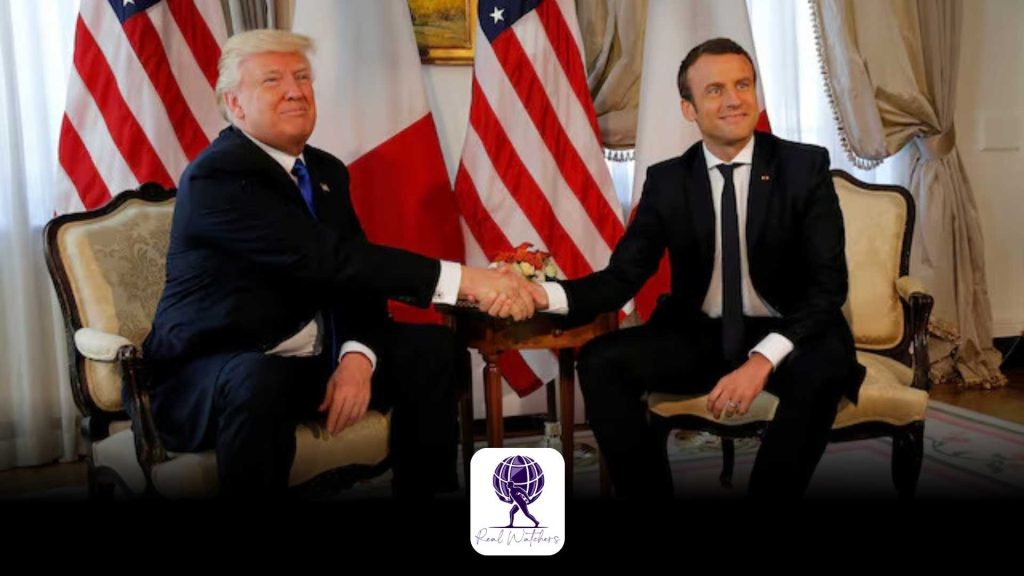Donald Trump, the U.S. President-elect, is set to reemerge on the global scene this Saturday as he joins fellow leaders to reopen the Notre Dame Cathedral in Paris. Although he remains a private citizen now, Trump is already gearing up to address various international challenges ahead.
Donald Trump‘s inaugural overseas visit following his recent presidential victory presents a significant opportunity for French President Emmanuel Macron. This trip may allow Macron to assume the role of mediator between Europe and the often unpredictable U.S. leader, a position he has embraced previously.
Former President Trump arrived at Paris Orly airport shortly before 0600 GMT on Saturday, according to reports from French media. Following his arrival, he proceeded to the U.S. Embassy near the French presidential palace.
On the sidelines of Saturday’s visit, the two are anticipated to hold a meeting. European leaders are expressing concerns over the potential withdrawal of U.S. military aid to Ukraine by Trump, particularly at a critical moment in the ongoing conflict against Russian forces. As these apprehensions mount, an official agenda for their discussions has yet to be revealed.
French President Emmanuel Macron has expressed robust support for the NATO alliance and Ukraine’s ongoing struggle, contrasting sharply with former President Donald Trump’s perspective. Trump advocates for European nations to contribute more financially to their collective defense and emphasizes the necessity of a negotiated settlement to resolve the conflict in Ukraine.
Mr. Macron is reiterating his tailored strategy, which saw some success during Mr. Trump’s initial term in office. Heather Conley, a senior adviser to the board of the German Marshall Fund, which advocates for U.S.-European relations, remarked, “Macron understands that Mr. Trump has a deep appreciation for the pomp, circumstance, and grandeur of state, and he offers it to him in ample measure.”
Former President Trump is set to participate in a significant ceremony marking the reopening of Notre Dame Cathedral. This event comes 5 1/2 years after a devastating fire severely damaged the historic structure and will see the attendance of numerous world leaders and foreign dignitaries.
Trump is set to meet with Britain’s Prince William, but it remains uncertain if he will engage with other leaders apart from Macron. The Trump transition team has yet to respond to inquiries seeking further details.
As Donald Trump prepares for his inauguration as U.S. president on January 20, he has already engaged in conversations with several global leaders. Meanwhile, his team is working diligently to familiarise themselves with various international crises, notably in Ukraine and the Middle East.
In a notable development, Mike Waltz, national security adviser to Trump, and Keith Kellogg, the envoy to Ukraine, convened on Wednesday in Washington with Andriy Yermak, Ukraine’s envoy. This meeting has sparked speculation regarding a potential encounter between Trump and Ukrainian President Volodymyr Zelenskiy, possibly set to take place in Paris.
According to a statement from Macron’s office, the French president is set to host a bilateral meeting with Trump at 1500 GMT at the Elysee Palace. This will be succeeded by a meeting with Zelenskiy one hour later. However, it remains to be seen if the three leaders will convene together.
During the 2019 fire at Notre Dame, Donald Trump, representing the Republican Party, was in office. After losing the 2020 reelection to Democrat Joe Biden, he returned on November 5, defeating Kamala Harris, Biden’s vice president, to reclaim the presidency.
In a striking parallel, the restoration of Mr. Trump’s presidency and Notre Dame occurred within a similar timeframe. Conley remarked that his visit to Paris marks the beginning of his global re-emergence, further undermining the Biden administration’s concluding days.
First Lady Jill Biden is set to represent the United States at the reopening of Notre Dame.
Trump is poised to generate significant global attention alongside fellow world leaders. During his presidency from 2017 to 2021, he made four visits to France, notably attending the D-Day anniversary ceremonies 2019.
“Trump is likely to be perceived globally in a role akin to that of a statesman,” remarked Republican strategist Doug Heye.
“It’s not photographs of him at Mar-a-Lago,” Heye stated, alluding to the Florida residence where Trump has predominantly resided since the election. “This event stands as one of the most significant on the global stage, where he will engage directly with fellow leaders.”
During their interactions, attention will be focused on the dynamics between Trump and Macron. The relationship between the two men has experienced several fluctuations over the years.
In July 2017, French President Emmanuel Macron invited former President Donald Trump to the Bastille Day military parade in Paris. This grand display left a significant impression on Trump, prompting him to organize a similar military parade in Washington, D.C., to commemorate America’s Independence Day in 2019.
In 2018, Trump welcomed Macron to a state dinner at the White House. However, tensions arose the following year when the two leaders clashed over remarks made by Macron regarding NATO’s condition.
“Trump’s visit to Paris represents a significant achievement for Emmanuel Macron,” remarked Gerard Araud, the former French ambassador to Washington. “Establishing a direct relationship with the key figure in the Trump administration, Donald Trump, is essential.”
With just over two years remaining in his presidency, Macron adopted a non-confrontational strategy towards Trump during the latter’s first term, believing that engagement could lead to favorable concessions.
Over the years, policy decisions regarding climate change and taxation, notably in Iran, have created tensions between the two leaders. Ultimately, the relationship had become increasingly contentious.
Anticipation of clashes looms, driven by Trump’s ambition to implement extensive tariffs on Europe and other trade partners, alongside ongoing disagreements regarding the approach to the Ukraine-Russia conflict.








